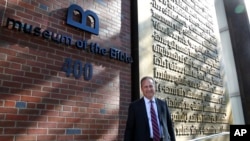The Museum of the Bible in Washington quietly replaced an artifact purported to be one of a handful of miniature Bibles that a NASA astronaut carried to the moon in 1971 after an expert questioned its authenticity.
The move follows an announcement last year that at least five of 16 Dead Sea Scroll fragments that had been on display at the museum were found to be apparent fakes.
The museum replaced the original microfilm Bible with one that was donated by an Oklahoma woman who wrote a book about the Apollo Prayer League, which arranged for Apollo 14 astronaut Edgar Mitchell to carry tiny Bibles to the moon.
“We know for sure that one on display right now went to the moon, but we could not verify for sure that the one we had originally on display had gone to the moon,” museum spokeswoman Heather Cirmo said. “We couldn’t disprove it, it just wasn’t certain.”
Evangelical Christian billionaires
The $500 million museum was largely funded by the Green family, evangelical Christian billionaires who run the Oklahoma City-based Hobby Lobby chain of craft stores. The purported “lunar” Bible is just the latest item purchased by the family to come under scrutiny.
Steve Green, museum founder and president of Hobby Lobby, also purchased thousands of Iraqi archaeological artifacts for a reported $1.6 million, but was forced in 2018 to return them to the Iraqi government and Hobby Lobby paid a $3 million fine after authorities said they were stolen from the war-torn country and smuggled into the U.S. Museum officials have said none of those items were ever part of its collection.
As for the Dead Sea Scrolls that were called into question, the 11 remaining fragments are being tested, with results expected by the end of the year, Cirmo said. Two of the fragments remain on display with signs noting that they are being tested.
The museum did not announce that it was replacing the lunar Bible — a decision Cirmo defended.
“It’s pretty ridiculous to think that any museum, that every time you switch something out you’re going to announce it on plaques,” Cirmo said. “Collectors make mistakes all the time. ... This is not something that is unique to Steve Green.”
The item that was previously displayed is now in storage, Cirmo said.
Authenticity concerns
Tulsa author Carol Mersch, who had raised concerns about its authenticity, donated the replacement Bible.
“(Green) is thankful, as is the museum, that someone came forward and donated one that actually went to the moon ... and that one didn’t cost anything,” Cirmo said.
Mersch was given 10 lunar Bibles by then-NASA chaplain the Rev. John Stout, a co-founder of the Apollo Prayer League.
Green, chairman of the museum’s board, bought the original Bible for about $56,000. It had also been displayed at the Vatican.
Mersch questioned its authenticity because it had a serial number that was only three digits; she said Stout engraved the authentic lunar Bibles with five-digit numbers. Mersch said the Bible she provided was authenticated by both Stout and Mitchell.
“I thought (donation) the best thing I could do to honor Rev. Stout. He had asked me to donate them to museums,” Mersch said.
Green bought the item that was originally on display from Georgia-based Peachstate Historical Consulting, which acquired the Bibles from Stout’s brother, James Stout. The Stout brothers are both dead, as is Mitchell. Peachstate owner David Frohman did not respond to requests for comment.
In an interview with The Associated Press a month before the museum’s 2017 opening, Green acknowledged the museum had made some mistakes early on.
“There’s a lot of complexities in areas that I’m still a novice at,” he said. “But we are engaging the best experts we can to advise and help us in that process.”






